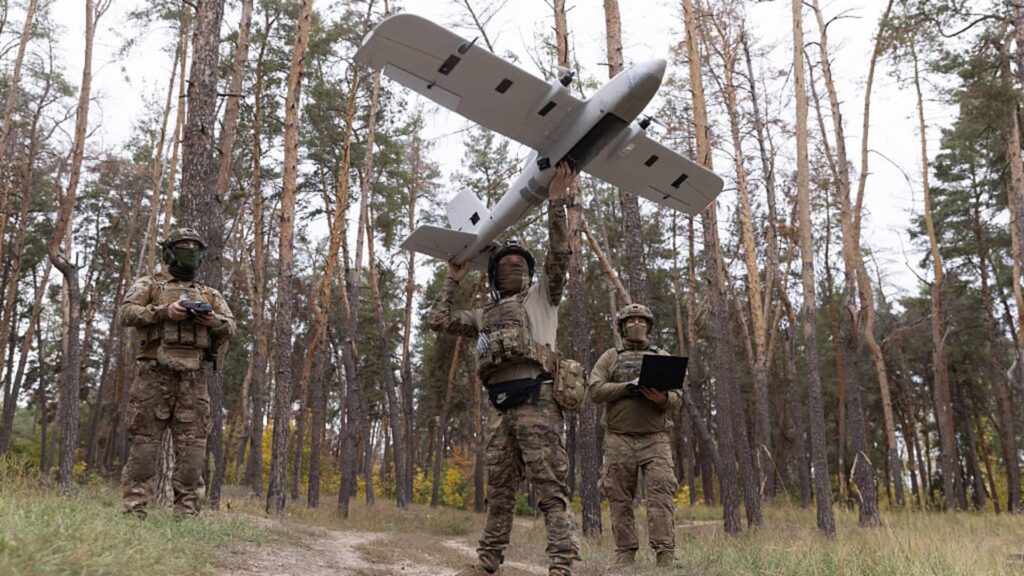
Defense industry leaders have expressed strong support for Europe’s ambitious plan to construct a “drone wall” along its eastern borders, a strategic move aimed at countering escalating security threats. The announcement was made during a high-level meeting of political leaders in Copenhagen, Denmark, on Wednesday, where discussions centered on enhancing the European Union’s defense capabilities and the financial mechanisms necessary to support such initiatives.
Swedish defense manufacturer Saab welcomed the proposal, emphasizing the need for a coordinated European response to the growing drone threat. “It is clear that the drone threat is rapidly increasing in civilian as well as military contexts and that a collaborative European effort could effectively meet this threat,” stated Mattias Rådström, head of media relations at Saab, in an email to CNBC.
Growing Momentum for a Drone Wall
In recent weeks, the concept of a multi-layered drone wall has gained significant traction. EU and NATO member states such as Poland, Estonia, Lithuania, and Romania, which are situated near Russia, have reported multiple airspace incursions involving Russian aircraft and drones. Similarly, Denmark and Norway have experienced disruptions due to unidentified drones, prompting calls for enhanced regional security measures.
Despite Russia’s denial of involvement, describing the accusations as “unfounded,” the incidents have intensified demands for a robust defense system to protect Europe’s eastern flank from potential threats.
Industry Support and Technological Solutions
European Commission President Ursula von der Leyen has underscored the importance of the initiative, describing it as “the bedrock of credible defense.” British defense contractor BAE Systems, which plays a pivotal role in European air defense through its Typhoon aircraft, expressed readiness to support NATO allies and partners in this endeavor.
“We stand ready to further support the initiatives and requirements of NATO allies and partners,” a BAE Systems spokesperson told CNBC by email.
German arms manufacturer Rheinmetall highlighted the increasing interest in unmanned aerial systems (UAS) and counter-UAS technologies. A spokesperson noted that while drones are relatively easy to target due to their low and slow flight patterns, the real challenge lies in detecting and defending against small or swarm drone attacks. Rheinmetall advocates for cannon-based drone defense as a cost-effective solution.
“Effective drone defense must combine several countermeasures, with cannon-based drone defense taking center stage in our view,” the Rheinmetall spokesperson explained.
Collaborative Efforts and Expertise Sharing
As EU leaders deliberated on the drone wall initiative, Denmark’s defense ministry announced contributions from several European nations in terms of anti-drone equipment, expertise, and personnel to bolster the country’s defenses. Ukraine, with its extensive experience in drone warfare due to ongoing conflict with Russia, has also shared its anti-drone expertise with Denmark.
Concerns and Challenges
Not all voices are entirely optimistic about the drone wall project. Jens Holzapfel, business director at Swedish defense drone company Nordic Air Defense (NAD), praised the initiative as “bold and ambitious” but cautioned against oversimplifying the concept. He stressed the importance of creating an interoperable network of radars, sensors, and countermeasures.
“This will be a network of radars, other sensors and countermeasures that need to be sort of interoperable and integrated. So, it is not an easy trick to pull off,” Holzapfel said.
Holzapfel also warned of potential bureaucratic hurdles within the EU, which could delay the project’s implementation. He highlighted the risk of drones being launched from within EU territories, drawing parallels to Ukraine’s “Spiderweb” drone attack on Russian targets earlier this year.
“My concern is that the establishment of the drone wall will drown in the regular European bureaucracy and haggling between member states over who’s calling the shots,” he added.
Looking Ahead
As Europe grapples with rising security challenges, the proposed drone wall represents a significant step toward enhancing regional defense capabilities. However, the success of this initiative will largely depend on effective collaboration among EU member states, timely implementation, and the integration of advanced technological solutions.
The coming months will be crucial in determining whether Europe can overcome internal challenges and establish a robust defense mechanism to safeguard its eastern borders against emerging threats.







